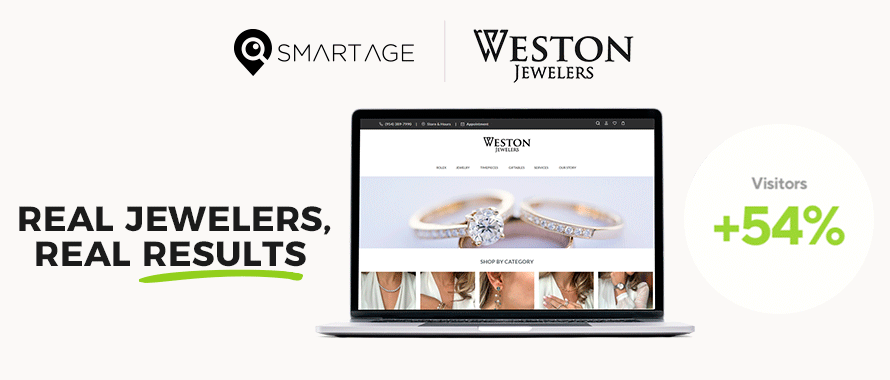Jewelry ECOMM Tech
Google Privacy Updates – The End of 3rd Party Cookies June 17, 2021 (0 comments)

Advertisers are having kind of a hard time right now.
Earlier this year, the CCPA hit Facebook advertising, thereby placing severe limitations on a brand’s ability to track and target California consumers.
Then, earlier this year, the impact of Apple’s iOS 14.5 update sent shock waves through advertising communities across the web.
Now, Google has announced that it will discontinue the use of third-party cookies in 2022.
In a recent Google blog post, the company detailed the reasoning behind this decision:
“As our industry has strived to deliver relevant ads to consumers across the web, it has created a proliferation of individual user data across thousands of companies, typically gathered through third-party cookies. This has led to an erosion of trust: In fact, 72% of people feel that almost all of what they do online is being tracked by advertisers, technology firms or other companies, and 81% say that the potential risks they face because of data collection outweigh the benefits, according to a study by Pew Research Center… That’s why last year Chrome announced its intent to remove support for third-party cookies, and why we’ve been working with the broader industry on the Privacy Sandbox to build innovations that protect anonymity while still delivering results for advertisers and publishers.”
The blog also expounded upon how Google would essentially supplant the technology to mitigate damage to its advertising platform and its users’ campaign performance.
That is what we are here to discuss. If your company is concerned about the removal of third-party cookies, the implications the decision will have for your brand and how to navigate these uncharted waters, then you have come to the right place.
As always, let’s lay the foundation for the discussion by establishing what exactly is happening and how it stands to impact eCommerce advertising efforts.
Google Ditches Third-Party Cookies: Clarifications and Implications
Let’s start with an important point: Just because Google is scrapping third-party cookies does not mean that Chrome tracking has come to an end.
Truth be told, while Google is discontinuing the use of third-party cookies in 2022, third-party cookies are just one of many tracking technologies that exist. Moreover, browsers like Safari and Firefox made this same move years ago.
Understanding this, as the originally-referenced blog goes on to state:
“Advances in aggregation, anonymization, on-device processing and other privacy-preserving technologies offer a clear path to replacing individual identifiers. In fact, our latest tests of FLoC show one way to effectively take third-party cookies out of the advertising equation and instead hide individuals within large crowds of people with common interests… This points to a future where there is no need to sacrifice relevant advertising and monetization in order to deliver a private and secure experience.”
Great!… But what does that mean?
Google’s Privacy Sandbox and Federated Learning of Cohorts
While Google is ending its use of third-party cookies and has no plans or intentions of building “alternate identifiers to track individuals as they browse across the web,” the company is looking to supplant some of the functionality of cookies with technology developed through Google’s Privacy Sandbox.
For those who are unaware, Google announced its Privacy Sandbox in 2019. This initiative is essentially aimed at producing a means of personalizing digital ads while maintaining user privacy.
That’s what Google claims about the initiative’s goals, anyway. More on this momentarily.
Google’s Privacy Sandbox ambitions are focused on establishing means to:
- Deliver ads to large groups of consumers without collecting personally identifying data from browsers
- Enable conversion measurements for advertisers, absent individual user tracking
- Implement fraud management measures on ads, such as preventing bot clicks
- Allow websites to harvest user data from browser APIs while still maintaining user anonymity
This is where Google’s Federated Learning of Cohorts (FLoC) comes into play.
In a recent Google blog post on building a privacy-first future for online advertising, the company details how FLoC advertising technology could be the answer to eliminating cookies while still allowing for interest-based targeting and consumer privacy.
Using FLoC, Chrome will track a user’s browsing habits across the web, ultimately placing them into various audience groups – or “cohorts” – based on their habits. Advertisers will then be able to target ads to different cohorts instead of individual consumers.
As of now, Google has yet to define what cohorts will exist. Nonetheless, they will be groups of folks with similar interests that sellers can then target with their ad campaigns.
Moreover, as Google details in its “privacy-first future” blog, FLoCs are apparently (almost) just as good at producing results as cookie-based ad campaigns:
“FLoC can provide an effective replacement signal for third-party cookies. Our tests of FLoC to reach in-market and affinity Google Audiences show that advertisers can expect to see at least 95% of the conversions per dollar spent when compared to cookie-based advertising.”
While this may sound all well and good, there are some implications and undercurrents that are important to discuss.
Advertising Implications
As it stands, there might be significant ramifications from Google’s decision for both consumers and retailers.
On the individual’s side of things, many might consider this to be a win for privacy, especially since this is how Google is framing the issue. However, there are many concerned that this move is little more than an enormous power grab by Google, with some likening FLoCs to “behavioral credit scores.”
On the business end of the matter, a variety of critics are arguing that the move is likely to put smaller advertising firms out of business and could also harm websites that rely on advertising revenue to survive.
The fact is that for most people, this massive change will be invisible. However, behind the scenes, Google is essentially placing Chrome in control over a considerable amount of the advertising process through its tracking and grouping of consumers into FLoCs.
That said, when third-party cookies are removed in 2022, businesses that have been collecting and leveraging first-party data might be capable of targeting adverts than those who are reliant on Google cohorts.
Therefore, in order for sellers to wrestle back some degree of control over their advertising efforts, it is vital for retailers to focus on customer relationships and the on-site experience as a means to amplify data collection efforts.


